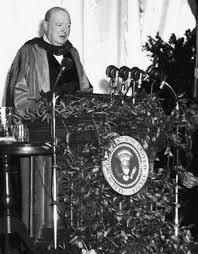Can a speech made by a former Prime Minister 68 years ago still be relevant today? When we're talking about Winston Churchill's Sinews of Peace address (aka 'the Iron Curtain speech'), the answer is a resounding "yes."
68 years ago today, Churchill stood in the crowded Westminster College gymnasium in Fulton, Missouri and shared his concerns about Communism, becoming the first to call out Russia for its takeover of Eastern European nations, which he claimed were becoming little more than puppet police states taking their direction from Moscow.
Churchill was widely condemned for the Fulton address. Labor MPs petitioned Prime Minister Clement Attlee to censure Churchill in the Commons, which he didn't do. Churchill heard the same insults he had endured during his "wilderness" in the 1930s, when his warnings about Hitler earned him labels like "imperialist" and "old Tory." Stalin himself dismissed his former wartime summit partner as a "warmonger." Most people in Britain and the US at the time still saw the Soviet Union as a wartime ally, and many believed that Communism - which they little understood thanks to Russian propaganda - was a viable alternative to democracy. Above all, they would do anything to avoid yet another global conflict. So their derision is understandable, and yet misplaced.
Everything Churchill claimed about the ills of Communism was true, and then some. Beyond the eradication of democracy in Eastern Europe, the Red Army had broken its promises to leave Iran, jeopardizing British and American oil supply and trade (sound familiar?). Stalin demanded military bases in Turkey, and this nation, Greece and China were on the brink of succumbing to Communist takeover. In Korea, the Soviets regularly cut off energy supplies to democratic regions to show who was really in control. Churchill and other leaders were rightly concerned that Communism would fill the void left by Hitler's demise in Germany, and Communist Party membership in Italy and France was rising dramatically. The threat to liberty and freedom was very real, and only Churchill could enunciate it, despite his loss of 10 Downing Street in the calamitous 1946 General Election.
In addition to warning about Russian malfeasance at home and abroad, Churchill suggested how the Western democracies should respond, and what they should avoid. Simply put: strength good, weakness bad. In Churchill's words, "From what I have seen of our Russian friends and Allies during the war, I am convinced that there is nothing they admire so much as strength, and there is nothing for which they have less respect than for weakness, especially military weakness." This was not, as Churchill's critics asserted, a battle cry, but was rather just stating a fact: show weakness and Russia will take advantage. Show strength, and you will earn respect.
Fast forward 68 years and much has changed in Russia since Churchill's wakeup call in Missouri. And yet much remains the same. The so-called "elections" that keep Putin in power (the most recent falling, ironically, on the same date as Churchill's Fulton address) are little more than stagecraftexpertly managed by the ex KGB man's cronies to give the world the false impression that real democracy is reality in Russia. Politicians who oppose the Kremlin are imprisoned or thrown out of (one-horse) political 'races.' Journalists who dare to tell the truth are silenced. Even citizens on foreign soil are not safe if they air a dissenting voice - as Alexander Litvinenko found out to his cost . There is certainly choice in modern Russia - if you choose Putin and his brand of hyper-masculine nationalism, you thrive. If not, you wilt.
So the Cold War may be over, Communism may have receded and Putin may be less of a tyrant than his post-World War II predecessors. But Churchill's words still ring true.
